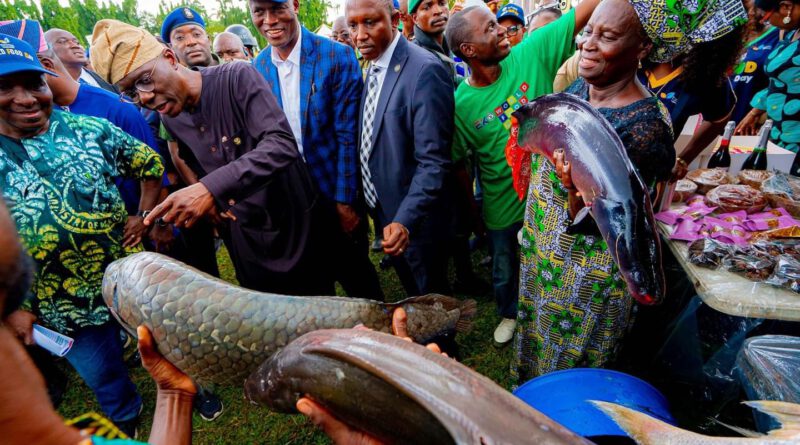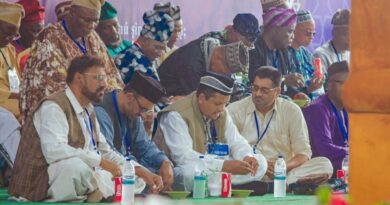Governor Babajide Sanwo-Olu Outlines Bold Initiatives for Food Security at Lagos 2024 World Food Day Celebration
In a powerful address marking the grand finale of the 2024 World Food Day celebration, Governor Babajide Olusola Sanwo-Olu unveiled a series of groundbreaking initiatives aimed at ensuring food security and strengthening the agricultural sector in Lagos State.
The event, held at the Police College Parade Ground in Ikeja, brought together stakeholders from across the agricultural sector, international organizations, and government agencies to highlight Lagos’ ongoing efforts to tackle food insecurity.
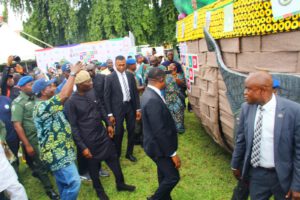
Speaking under the theme “Right to Food for a Better Life and a Better Future,” the governor emphasized the crucial role that food security plays in national stability, economic prosperity, and the overall well-being of Lagosians. Citing the words of former UN Secretary-General Kofi Annan—”Food is the foundation of life; it is the key to health, peace, and prosperity for all”—Sanwo-Olu underscored that access to nutritious and affordable food is not just a necessity but a fundamental right, as enshrined in the Universal Declaration of Human Rights.
Tackling Food Security Challenges in Lagos
Despite being the smallest state in Nigeria by landmass, Lagos is home to the largest population, with about 22% of its territory covered by water bodies. This geographical constraint has posed unique challenges to food production and security, but Governor Sanwo-Olu reaffirmed his administration’s commitment to overcoming these hurdles. His government, he said, is taking a multifaceted approach to agriculture and food systems, aimed at ensuring food sufficiency and reducing dependence on external sources.

To further this vision, the Ministry of Agriculture has been rebranded as the Ministry of Agriculture and Food Systems, a strategic move designed to prioritize food systems management, increase mechanization, improve food safety, and ultimately lower food prices.
“We are implementing a comprehensive Food Systems Transformation Agenda to build a resilient and secure food ecosystem,” Sanwo-Olu announced. “This initiative will focus on reducing post-harvest losses, decongesting traffic around food markets, and boosting state revenue.” A major part of this agenda is the ongoing construction of the Lagos Central Food Security System and Logistics Hub at Ketu-Ereyun, which is expected to be completed by December 2024. The facility will streamline food distribution and logistics across the state, ensuring timely and efficient access to food for residents.
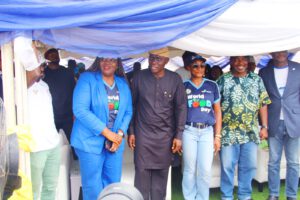
Rice Production and Mechanized Agriculture
Governor Sanwo-Olu also highlighted the success of the Lagos Rice Mill at Imota, a 32-ton-per-hour facility that will produce 2.4 million bags of rice annually. The mill, which is among the largest in Africa, aims to significantly reduce Lagos’ reliance on imported rice and create over 250,000 direct and indirect jobs, contributing to the state’s economic growth.
In a bid to modernize farming practices, the Eko Agro Mechanization Program was launched, integrating cutting-edge technology into agriculture. This program has already revolutionized farming methods in Lagos, enabling farmers to access mechanization services through partnerships with the private sector. Over 100,000 women and youth have been trained across various agricultural value chains, receiving support in terms of inputs, infrastructure, and equipment.
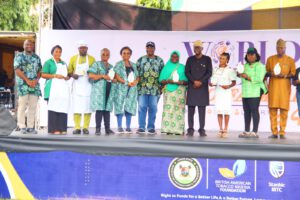
Strengthening Local Food Production
The governor’s address also highlighted a range of initiatives designed to boost local food production and reduce Lagos’ dependence on external food supplies. The Cattle Feedlot Project at Igbodu, for example, is set to reduce the importation of cattle into Lagos by 50% over the next five years, while providing disease-free, locally sourced beef to residents. Similarly, the Lagos Aquaculture Centre of Excellence (LACE) is addressing the rising demand for fish, contributing to the state’s food supply and enhancing economic growth.
Lagos is also advancing its Produce for Lagos initiative, which is identifying production clusters to enhance local food output. Poultry farmers and vegetable growers are receiving state support in the form of infrastructure, inputs, and market access, helping them to increase yields and improve their livelihoods.
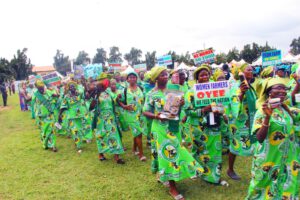
In collaboration with international partners like the World Bank, the Lagos State Government has also implemented projects such as the Agro-Processing, Productivity Enhancement, and Livelihood Improvement Support Project (APPEALS) and Lagos CARES. These programs have improved agricultural infrastructure, reduced post-harvest losses, and facilitated better market access for farmers across the state.
Promoting Food Hygiene and Safety
A key focus of the governor’s speech was the importance of maintaining high food safety standards. The newly launched Eko Last-Mile Meat Shop and Lagos Butchers Academy aim to ensure that all red meat sold in Lagos adheres to stringent hygiene standards. These initiatives are transforming butchery into a professional, regulated industry, guaranteeing that consumers receive safe, high-quality meat.
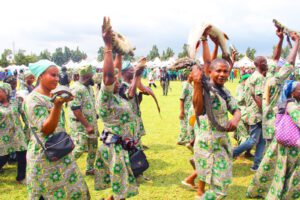
In addition, the Eko Flavours project is celebrating the culinary talents of Lagos’ youth, promoting the diversity of local food vendors and enhancing the state’s vibrant food culture.
Inspiring the Next Generation of Farmers
The governor also revealed that the state’s efforts to secure its food future are being extended to the younger generation through the Lagos Agricultural Scholars Program. This initiative is introducing sustainable farming practices to secondary school students, equipping them with the knowledge and skills necessary to pursue careers in agriculture.
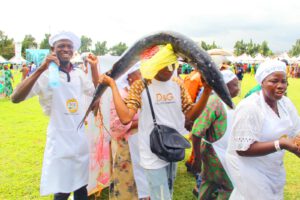
A Vision for a Food-Secure Lagos
In his concluding remarks, Governor Sanwo-Olu reaffirmed his administration’s vision of making Lagos a model for food security in Nigeria. He expressed his gratitude to farmers, agro-allied organizations, and other partners for their unwavering commitment to achieving this goal.
“As we celebrate World Food Day, let us renew our commitment to making agriculture the backbone of our state’s economy. Together, we can ensure that no Lagosian goes hungry and that our state continues to thrive through sustainable food systems,” Sanwo-Olu declared.
The 2024 World Food Day celebration in Lagos serves as a reminder of the importance of collective action in addressing food security challenges. With these bold initiatives, the state is positioning itself as a leader in sustainable agriculture and food systems transformation.

